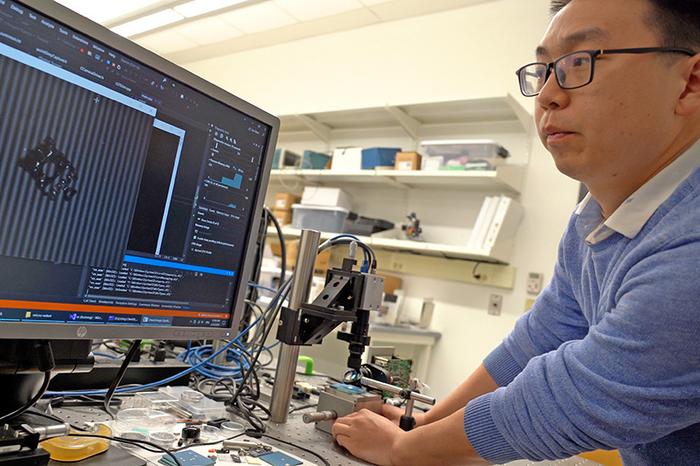WEST LAFAYETTE, Ind. — Researchers in Purdue University’s College of Engineering are developing patented and patent-pending innovations that make 3D microscopes faster to operate and less expensive to manufacture.

Credit: (Purdue University photo/Jared Pike)
WEST LAFAYETTE, Ind. — Researchers in Purdue University’s College of Engineering are developing patented and patent-pending innovations that make 3D microscopes faster to operate and less expensive to manufacture.
Traditional, large depth-of-field 3D microscopes are used across academia and industry, with applications ranging from the life sciences to quality control processes used in semiconductor manufacturing. Song Zhang, professor in Purdue’s School of Mechanical Engineering, said they are too slow to capture 3D images and too expensive to build due to the requirement of a high-precision translation stage.
“Such drawbacks in a microscope slow the measurement process, making it difficult to use for applications that require high speeds, such as in situ quality control,” Zhang said.
Research about the Purdue 3D microscope and its innovations has been published in the peer-reviewed Optics Letters and the August 2023 and March 2024 issues of the peer-reviewed Optics and Lasers in Engineering. The National Science Foundation awarded a grant to conduct the research.
The Purdue innovation
Zhang said the Purdue 3D microscope automatically completes three steps: focusing in on an object, determining the optimal capture process and creating a high-quality 3D image for the end user.
“In contrast, a traditional microscope requires users to carefully follow instructions provided by the manufacturer to perform a high-quality capture,” Zhang said.
Zhang and his colleagues use an electronically tunable lens, or ETL, that changes the focal plane of the imaging system without moving parts. He said using the lens makes the 3D microscope easier to use and less expensive to build.
“Our suite of patents covers methods on how to calibrate the ETL, how to create all-in-focus 3D images quickly and how to speed up the data acquisition process by leveraging the ETL hardware information,” Zhang said. “The end result is the same as a traditional microscope: 3D surface images of a scene. Ours is different because of its high speed and relatively low cost.”
The next developmental steps
Zhang and his team have developed algorithms and created a prototype system in their lab. They are looking to translate their research into a commercial product.
“This will require an industrial partner,” Zhang said. “We are certainly interested in helping this process, including sharing our know-how and research results to make the transition smooth.”
Zhang disclosed the innovations to the Purdue Innovates Office of Technology Commercialization, which has applied for and received patents to protect the multiple pieces of intellectual property. Industry partners interested in developing or commercializing the work should contact Matt Halladay, senior business development manager and licensing manager, physical sciences, at mrhalladay@prf.org, about track codes 2016-ZHAN-67257, 2023-ZHAN-69939 and 2024-ZHAN-70619.
About Purdue Innovates Office of Technology Commercialization
The Purdue Innovates Office of Technology Commercialization operates one of the most comprehensive technology transfer programs among leading research universities in the U.S. Services provided by this office support the economic development initiatives of Purdue University and benefit the university’s academic activities through commercializing, licensing and protecting Purdue intellectual property. In fiscal year 2023, the office reported 150 deals finalized with 203 technologies signed, 400 disclosures received and 218 issued U.S. patents. The office is managed by the Purdue Research Foundation, which received the 2019 Innovation & Economic Prosperity Universities Award for Place from the Association of Public and Land-grant Universities. In 2020, IPWatchdog Institute ranked Purdue third nationally in startup creation and in the top 20 for patents. The Purdue Research Foundation is a private, nonprofit foundation created to advance the mission of Purdue University. Contact otcip@prf.org for more information.
About Purdue University
Purdue University is a public research institution demonstrating excellence at scale. Ranked among top 10 public universities and with two colleges in the top four in the United States, Purdue discovers and disseminates knowledge with a quality and at a scale second to none. More than 105,000 students study at Purdue across modalities and locations, including nearly 50,000 in person on the West Lafayette campus. Committed to affordability and accessibility, Purdue’s main campus has frozen tuition 13 years in a row. See how Purdue never stops in the persistent pursuit of the next giant leap — including its first comprehensive urban campus in Indianapolis, the new Mitchell E. Daniels, Jr. School of Business, and Purdue Computes — at https://www.purdue.edu/president/strategic-initiatives.
Writer/Media contact: Steve Martin, sgmartin@prf.org
Source: Song Zhang, szhang15@purdue.edu
Journal
Optics and Lasers in Engineering
Article Title
Electrically tunable lens assisted absolute phase unwrapping for large depth-of-field 3D microscopic structured-light imaging
Article Publication Date
1-Mar-2024



